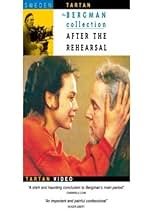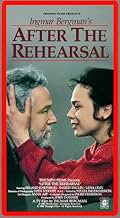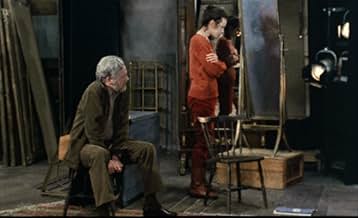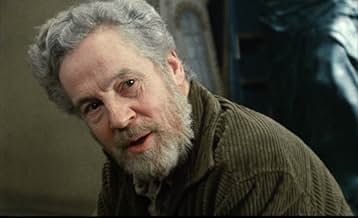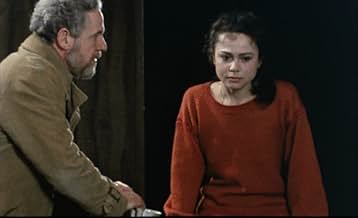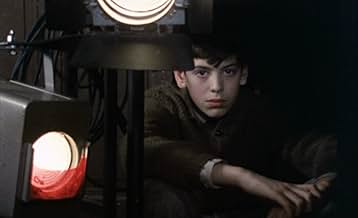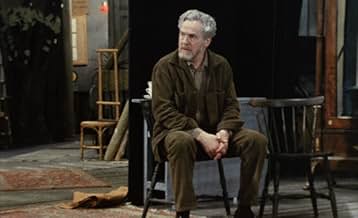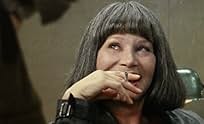IMDb RATING
7.1/10
3.2K
YOUR RATING
As an aging playwright interacts with the young lead in his play after everybody's gone home, he reminisces about her mother, whom he maintained a sexual relationship with before she died.As an aging playwright interacts with the young lead in his play after everybody's gone home, he reminisces about her mother, whom he maintained a sexual relationship with before she died.As an aging playwright interacts with the young lead in his play after everybody's gone home, he reminisces about her mother, whom he maintained a sexual relationship with before she died.
- Awards
- 2 nominations total
- Director
- Writer
- All cast & crew
- Production, box office & more at IMDbPro
7.13.2K
1
2
3
4
5
6
7
8
9
10
Featured reviews
Bergman muses through a character
"After the Rehearsal was meant to be a pleasant little episode on my road toward death. ... (It) had a lot to do with my attitude and my relationship with the theater and the actors, with this dirty, dubious, fantastic, incredible, and cruel profession. That's all." -- Ingmar Bergman
Ingmar Bergman, age 66 and a couple years after his final feature film, Fanny and Alexander, was active in theater work and had a few TV movies left in him, of which this film is one. It takes place on a single set, a stage, has just three characters, and has the feeling of a simple play itself. It starts slowly but bear with it, it's only 73 minutes and finishes well.
Erland Josephson plays a theater director (without a doubt Bergman himself), who is musing in the empty theater after a rehearsal one day. His leading lady (Lena Olin) shows up on the pretext of looking for her bracelet; she's young enough to be his daughter, but has an interest in him. The two talk about their craft but also their personal lives, and as we come to understand that her mother worked with and loved him, she's conjured up in his imagination (Ingrid Thulin). It was a treat to see all three of these actors but maybe Thulin most of all, who at 58 has her character voice the sadness of aging, echoing the theater director in the present, even though she's still quite beautiful.
While it seemed a little bit vain of Bergman to have both the older and younger woman want him, er, the director sexually, the conversations build in momentum until with Olin he imagines the course their relationship would take if they gave in to their desire. It feels autobiographical and honest, helping to make up for a work that otherwise feels rather staid and erudite. While the film doesn't live up to its full potential, it's worth watching, especially if you're a Bergman fan.
Some quotes: "At my age, sometimes when you lean forward, your head suddenly finds itself in another reality. The dead are no longer dead. The living appear like ghosts. What was obvious a minute earlier becomes peculiar and hard to grasp."
"I'll tell you the pure and simple truth: I love actors. I love them as phenomena. I love their profession. I love their courage, or their contempt for death, whatever you want to call it. I understand their desire to escape, but also their dark, ruthless honesty."
"I hate turmoil, aggression, and outbursts of emotion. I administrate, distribute, and organize. I don't participate in the drama, I give it material form. I hate all things spontaneous, rash, and imprecise. I have no room for my own confusion except as a key to secrets of a script or as a stimulus for the creativity of actors."
"Nurture your childishness. It's a good filter against consciousness."
Ingmar Bergman, age 66 and a couple years after his final feature film, Fanny and Alexander, was active in theater work and had a few TV movies left in him, of which this film is one. It takes place on a single set, a stage, has just three characters, and has the feeling of a simple play itself. It starts slowly but bear with it, it's only 73 minutes and finishes well.
Erland Josephson plays a theater director (without a doubt Bergman himself), who is musing in the empty theater after a rehearsal one day. His leading lady (Lena Olin) shows up on the pretext of looking for her bracelet; she's young enough to be his daughter, but has an interest in him. The two talk about their craft but also their personal lives, and as we come to understand that her mother worked with and loved him, she's conjured up in his imagination (Ingrid Thulin). It was a treat to see all three of these actors but maybe Thulin most of all, who at 58 has her character voice the sadness of aging, echoing the theater director in the present, even though she's still quite beautiful.
While it seemed a little bit vain of Bergman to have both the older and younger woman want him, er, the director sexually, the conversations build in momentum until with Olin he imagines the course their relationship would take if they gave in to their desire. It feels autobiographical and honest, helping to make up for a work that otherwise feels rather staid and erudite. While the film doesn't live up to its full potential, it's worth watching, especially if you're a Bergman fan.
Some quotes: "At my age, sometimes when you lean forward, your head suddenly finds itself in another reality. The dead are no longer dead. The living appear like ghosts. What was obvious a minute earlier becomes peculiar and hard to grasp."
"I'll tell you the pure and simple truth: I love actors. I love them as phenomena. I love their profession. I love their courage, or their contempt for death, whatever you want to call it. I understand their desire to escape, but also their dark, ruthless honesty."
"I hate turmoil, aggression, and outbursts of emotion. I administrate, distribute, and organize. I don't participate in the drama, I give it material form. I hate all things spontaneous, rash, and imprecise. I have no room for my own confusion except as a key to secrets of a script or as a stimulus for the creativity of actors."
"Nurture your childishness. It's a good filter against consciousness."
Much more than a minor work
I may be biased though as I love and admire Ingmar Bergman. After The Rehearsal mayn't be among Bergman's very finest films, but it does deserve to be much more regarded as just a minor work. It could have done with being longer perhaps but all the things that make a Bergman film work are here. The cinematography from none other than Sven Nykvist is tight and helps to intensify After the Rehearsal's intriguing drama, while the setting looks beautiful yet realistic. Bergman as he always did directs with discipline, never once is there a sense that his heart was not in it. The scripting is intelligent and provokes a lot of thought, likewise the story is insightful in regard to art and emotion- I always admired how ambitious the themes in his films were- and almost autobiographical in structure. I have seen and heard people remark that they were indifferent to the characters, now the characters in Bergman's films are not always that likable but considering how realistically compelling they are(especially the women) you do get the sense that they weren't meant to be. Adding to this is how superbly acted After the Rehearsal is, you get that expectation seeing as we are talking about some of Sweden's finest ever actors and never here are you disappointed. All three leads, very hard to single out a standout, are really captivating and immerse themselves totally into the characters. All in all, very, very good. 9/10 Bethany Cox
10agboone7
Bergman's final masterpiece is also his most profound and introspective film
I've always said that I could never choose a favorite filmmaker, but that if I had to, it would be Ingmar Bergman, for certain. A bit of a contradiction, I admit, but there you have it. For me, he is the grandmaster of the cinema. I've seen exactly forty of his films, and "After the Rehearsal" may be the greatest of them all.
Of course, that depends very much on your tastes. We see here a very different Bergman from the one many viewers are accustomed to. There are, after all, two Ingmar Bergmans: First, we have Bergman the magician, the cinematic sorcerer who made films like "The Seventh Seal" and "Persona". Secondly, we have Bergman the realist, emerging during the latter period of his career, with films like "Scenes From a Marriage" and "Autumn Sonata". These films aren't quite realism, of course — they're still very formal — but they're certainly very stripped-down and minimalistic by comparison.
"After the Rehearsal" is probably the most extreme example of this latter category of Bergman's cinema. It is a minimalist exercise in what is essentially filmed theater. As a result, those looking for the kind of cinematic wizardry that Bergman displayed in so many of his films up through the '60s (and which he revived for "Fanny and Alexander" in 1982) may be a bit disappointed by this film, strictly in aesthetic and stylistic terms. Nyqvist's cinematography is absolutely masterful, as always, but it's masterful in the same way it was in "Scenes From a Marriage" — unrelenting close-ups of the frail human condition, et cetera — versus the kind of technical and formal mastery he displayed in "Fanny and Alexander" or Tarkovsky's "The Sacrifice". This is a low-budget, theatrical production, so don't expect a grand tour de force of Bergmanian cinema.
On the other hand, when it comes to content, that's exactly what "After the Rehearsal" is. It offers the most insightful, profound exposition yet of Bergman's identity, essence, and point of view as an artist, as a filmmaker (and as a theater director), and perhaps most notably, as a human being. Every line, every word, every expression, every intonation, every gesture is a revelation of the most meaningful variety, for those who are familiar with Bergman and his way of expressing ideas. Never before has Bergman condensed so much thought, so many ideas and themes, into one film (and quite a short one at that). This is a concentrated exercise in subtextual expression, and on that note, I have two caveats to issue to those considering watching this film.
First, as we know, most audiences today don't like to be provoked toward thought, analysis, or self-reflection, so if you're turned off by the idea of watching two people talk for seventy minutes straight, save yourself the effort and skip this one. "After the Rehearsal", even more than normal for a Bergman film, requires the ability to think in thematic, subtextual, and metaphorical terms. Even for the most avid Bergman fans, and even by the strictest Bergman standards, this film requires patience and thorough analysis.
Secondly, I'm a firm believer in experiencing a filmmaker's body of work chronologically. I know many viewers don't share this compulsion, but I must stress that it is crucial for this film. "After the Rehearsal" is a deep and painstaking reflection on everything Bergman has ever done and everything he has ever been during the course of his long and illustrious career. If you haven't seen the vast majority of Bergman's previous work, this film will be impossible to fully appreciate.
Virtually all of Bergman's recurring themes are present in "After the Rehearsal", such as the idea of human beings as actors in this often shoddy, second-rate production that we call life. Bergman's characters engage in emotional dialogue or intensive introspection, and then, hearing the words come out of their mouths, they experience shame and mortification as a result of what they perceive to be their own playacting and histrionics, and so they subsequently backpedal over their previous statements with a tone of fatigue and despair. It's not just Bergman's characters, however, that exhibit this behavior. Bergman himself does it, from film to film. The first time we saw it was in "Prison" (1949), his sixth film, when he criticized himself in a moment of self-reference that cited a scene from "It Rains on Our Love" (I believe). Since then, and especially in his later work, it's been a constant for Bergman, although much more subtle and less explicit than it was in "Prison". In a way, it provides a metaphor for what Bergman does with "After the Rehearsal".
"Fanny and Alexander" is considered Bergman's swan song, and I suppose it is. He officially retired from cinema afterwards, and everything he directed since then, with the exception of "The Making of Fanny and Alexander", was a television film, including "After the Rehearsal", in which Bergman makes one last attempt to clarify himself, to backpedal on a career of directing films and plays, and to explain what it all meant, and what he has become in light of it.
"After the Rehearsal" is a highly self-reflexive, metatextual meditation on what it means to be a director. The power, the manipulation, the messy emotions and relationships with actors who often confuse the role they play in a film (or play) with the role they play in life. The two roles begin to converge, and at the helm of it all, there is Bergman, a man who is slowly but surely distancing himself from the world around him. The world of cinema. The world of theater. The world of life.
Ultimately, that's what "After the Rehearsal" is about. It's Bergman's explanation and exploration of the reasons why he has chosen to distance himself from the world of filmmaking, and it's brilliant for every moment of its 72 minutes.
RATING: 9.67 out of 10 stars
Of course, that depends very much on your tastes. We see here a very different Bergman from the one many viewers are accustomed to. There are, after all, two Ingmar Bergmans: First, we have Bergman the magician, the cinematic sorcerer who made films like "The Seventh Seal" and "Persona". Secondly, we have Bergman the realist, emerging during the latter period of his career, with films like "Scenes From a Marriage" and "Autumn Sonata". These films aren't quite realism, of course — they're still very formal — but they're certainly very stripped-down and minimalistic by comparison.
"After the Rehearsal" is probably the most extreme example of this latter category of Bergman's cinema. It is a minimalist exercise in what is essentially filmed theater. As a result, those looking for the kind of cinematic wizardry that Bergman displayed in so many of his films up through the '60s (and which he revived for "Fanny and Alexander" in 1982) may be a bit disappointed by this film, strictly in aesthetic and stylistic terms. Nyqvist's cinematography is absolutely masterful, as always, but it's masterful in the same way it was in "Scenes From a Marriage" — unrelenting close-ups of the frail human condition, et cetera — versus the kind of technical and formal mastery he displayed in "Fanny and Alexander" or Tarkovsky's "The Sacrifice". This is a low-budget, theatrical production, so don't expect a grand tour de force of Bergmanian cinema.
On the other hand, when it comes to content, that's exactly what "After the Rehearsal" is. It offers the most insightful, profound exposition yet of Bergman's identity, essence, and point of view as an artist, as a filmmaker (and as a theater director), and perhaps most notably, as a human being. Every line, every word, every expression, every intonation, every gesture is a revelation of the most meaningful variety, for those who are familiar with Bergman and his way of expressing ideas. Never before has Bergman condensed so much thought, so many ideas and themes, into one film (and quite a short one at that). This is a concentrated exercise in subtextual expression, and on that note, I have two caveats to issue to those considering watching this film.
First, as we know, most audiences today don't like to be provoked toward thought, analysis, or self-reflection, so if you're turned off by the idea of watching two people talk for seventy minutes straight, save yourself the effort and skip this one. "After the Rehearsal", even more than normal for a Bergman film, requires the ability to think in thematic, subtextual, and metaphorical terms. Even for the most avid Bergman fans, and even by the strictest Bergman standards, this film requires patience and thorough analysis.
Secondly, I'm a firm believer in experiencing a filmmaker's body of work chronologically. I know many viewers don't share this compulsion, but I must stress that it is crucial for this film. "After the Rehearsal" is a deep and painstaking reflection on everything Bergman has ever done and everything he has ever been during the course of his long and illustrious career. If you haven't seen the vast majority of Bergman's previous work, this film will be impossible to fully appreciate.
Virtually all of Bergman's recurring themes are present in "After the Rehearsal", such as the idea of human beings as actors in this often shoddy, second-rate production that we call life. Bergman's characters engage in emotional dialogue or intensive introspection, and then, hearing the words come out of their mouths, they experience shame and mortification as a result of what they perceive to be their own playacting and histrionics, and so they subsequently backpedal over their previous statements with a tone of fatigue and despair. It's not just Bergman's characters, however, that exhibit this behavior. Bergman himself does it, from film to film. The first time we saw it was in "Prison" (1949), his sixth film, when he criticized himself in a moment of self-reference that cited a scene from "It Rains on Our Love" (I believe). Since then, and especially in his later work, it's been a constant for Bergman, although much more subtle and less explicit than it was in "Prison". In a way, it provides a metaphor for what Bergman does with "After the Rehearsal".
"Fanny and Alexander" is considered Bergman's swan song, and I suppose it is. He officially retired from cinema afterwards, and everything he directed since then, with the exception of "The Making of Fanny and Alexander", was a television film, including "After the Rehearsal", in which Bergman makes one last attempt to clarify himself, to backpedal on a career of directing films and plays, and to explain what it all meant, and what he has become in light of it.
"After the Rehearsal" is a highly self-reflexive, metatextual meditation on what it means to be a director. The power, the manipulation, the messy emotions and relationships with actors who often confuse the role they play in a film (or play) with the role they play in life. The two roles begin to converge, and at the helm of it all, there is Bergman, a man who is slowly but surely distancing himself from the world around him. The world of cinema. The world of theater. The world of life.
Ultimately, that's what "After the Rehearsal" is about. It's Bergman's explanation and exploration of the reasons why he has chosen to distance himself from the world of filmmaking, and it's brilliant for every moment of its 72 minutes.
RATING: 9.67 out of 10 stars
Soap writ existential..
This is only my second Ingmar Bergman viewing, the first being the magnificent "Seventh Seal", which left me with a long lasting impression. Perhaps it is not fair to compare this little ditty to the impressive, thoughtful epic that was the former film, but it was with such unrealistic expectations that I started watching "After the Rehearsal".
Unfortunately, I left the film disappointed and indifferent. The plot revolves around an aging play director's relation to his young lead actress, and concerns itself with acting, the personal relations of people in the profession, parenthood and estrangement. Alas, I'm afraid even my simplistic presentation makes the film sound far more interesting than it really is. In the end, "After the Rehearsal" only amounts to a monotonous (if articulate) study of romantic and interpersonal manipulation. I suppose viewers interested in acting and the theater might find something of interest in this movie, especially concerning the issues of what it means to act and direct, and how it affects persons of the field.
Personally, however, I was not engaged at all to the characters' petty personal issues, nor could I project parallels to issues larger than their own particular microcosm from their mundane -if eloquent- verbal sparring. If the "Sevent Seal"'s characters could be likened to those of Dostoyevsky's literature, "After the Rehearsal"'s protagonists would be more similar to Oscar Wilde's aestheticists and their monologues. Who do you prefer?
Unfortunately, I left the film disappointed and indifferent. The plot revolves around an aging play director's relation to his young lead actress, and concerns itself with acting, the personal relations of people in the profession, parenthood and estrangement. Alas, I'm afraid even my simplistic presentation makes the film sound far more interesting than it really is. In the end, "After the Rehearsal" only amounts to a monotonous (if articulate) study of romantic and interpersonal manipulation. I suppose viewers interested in acting and the theater might find something of interest in this movie, especially concerning the issues of what it means to act and direct, and how it affects persons of the field.
Personally, however, I was not engaged at all to the characters' petty personal issues, nor could I project parallels to issues larger than their own particular microcosm from their mundane -if eloquent- verbal sparring. If the "Sevent Seal"'s characters could be likened to those of Dostoyevsky's literature, "After the Rehearsal"'s protagonists would be more similar to Oscar Wilde's aestheticists and their monologues. Who do you prefer?
Nice, small, and inventive.
Here's an interesting little movie with a cast of three, set entirely on a stage, and that jumps backwards and forwards in time.
Henrik is a theater director spending some time alone on the stage after a rehearsal of A Dream Play by August Strindberg. He wants to collect himself before he returns to his domicile to take a nap prior to that night's rehearsal. As he sits there, one of his actresses, Anna, arrives on stage with a thin story of looking for a bracelet. What follows is a long conversation between the two that swirls around topics as it operates as some kind of seduction, direction, and exploration of the other.
About a third of the way through, something happens that is quite jarring at first. Another woman shows up on stage. This is Rakel, Anna's mother who has been dead for ten years. Anna sits on the couch watching the scene without moving or speaking, and we soon deduce that Henrik is playing out a conversation he had had with Rakel eleven years before, just prior to her death.
Rakel was a great actress in her day. She played the same role Anna is playing to great acclaim, but she had Anna and quit acting. At the time of the conversation, she's living in a hospital and the small role she's playing (the mother) is almost an act of pity on the part of Henrik. He used to love her, but she spurned his affections before. However, in this conversation, she throws herself at him, and Henrik cannot stand it. He eventually makes an empty promise to follow her to her room, but we get the impression that there's going to be no encounter.
The conversation returns to Anna as Henrik takes up the exact same position he had been in when Rakel had walked on, implying that what we had seen was just a memory that had passed in a flash. In this final third of the film, souls are bared and dark revelations of Anna's recent past come out. There are protestations of love and hate. It's a swirl of emotions that's surprisingly effective.
The movie ends when the camera suddenly cuts to a new view we haven't seen before. The movie has almost entirely shot with cameras from the audience pit, but the final shot is to the stage from the side. We see a giant brick wall and the director and young actress small against it. The conversation even changes tenor becoming more professional in nature than emotional. Something's drastically changed.
Early in the movie, Henrik talks about how he's willing to do anything to work with actors (whom he loves) in order to help them reach their potential. He looks like he's playing in their field, but he's never really involved. So, at that final shot, those words came back to me, and I asked, "Was it all an act?" Were the high emotions and swings all about directing his actor?
It's an interesting exploration of the relationship between directors and actors, something obviously intimately familiar to Bergman. Watching the movie, it became obvious how Bergman could strike up so many affairs with so many of his actresses, and, at the same time, how they could all fall apart in the end. Still, the movie is a little insular to acting specifically which limits its broad appeal. It's a good little movie, a fascinating little footnote in Bergman's career.
Henrik is a theater director spending some time alone on the stage after a rehearsal of A Dream Play by August Strindberg. He wants to collect himself before he returns to his domicile to take a nap prior to that night's rehearsal. As he sits there, one of his actresses, Anna, arrives on stage with a thin story of looking for a bracelet. What follows is a long conversation between the two that swirls around topics as it operates as some kind of seduction, direction, and exploration of the other.
About a third of the way through, something happens that is quite jarring at first. Another woman shows up on stage. This is Rakel, Anna's mother who has been dead for ten years. Anna sits on the couch watching the scene without moving or speaking, and we soon deduce that Henrik is playing out a conversation he had had with Rakel eleven years before, just prior to her death.
Rakel was a great actress in her day. She played the same role Anna is playing to great acclaim, but she had Anna and quit acting. At the time of the conversation, she's living in a hospital and the small role she's playing (the mother) is almost an act of pity on the part of Henrik. He used to love her, but she spurned his affections before. However, in this conversation, she throws herself at him, and Henrik cannot stand it. He eventually makes an empty promise to follow her to her room, but we get the impression that there's going to be no encounter.
The conversation returns to Anna as Henrik takes up the exact same position he had been in when Rakel had walked on, implying that what we had seen was just a memory that had passed in a flash. In this final third of the film, souls are bared and dark revelations of Anna's recent past come out. There are protestations of love and hate. It's a swirl of emotions that's surprisingly effective.
The movie ends when the camera suddenly cuts to a new view we haven't seen before. The movie has almost entirely shot with cameras from the audience pit, but the final shot is to the stage from the side. We see a giant brick wall and the director and young actress small against it. The conversation even changes tenor becoming more professional in nature than emotional. Something's drastically changed.
Early in the movie, Henrik talks about how he's willing to do anything to work with actors (whom he loves) in order to help them reach their potential. He looks like he's playing in their field, but he's never really involved. So, at that final shot, those words came back to me, and I asked, "Was it all an act?" Were the high emotions and swings all about directing his actor?
It's an interesting exploration of the relationship between directors and actors, something obviously intimately familiar to Bergman. Watching the movie, it became obvious how Bergman could strike up so many affairs with so many of his actresses, and, at the same time, how they could all fall apart in the end. Still, the movie is a little insular to acting specifically which limits its broad appeal. It's a good little movie, a fascinating little footnote in Bergman's career.
Did you know
- TriviaIngmar Bergman was so impressed when he met Lena Olin for the first time that he wrote the part of Anna especially for her.
Details
Box office
- Gross worldwide
- $942
Contribute to this page
Suggest an edit or add missing content

